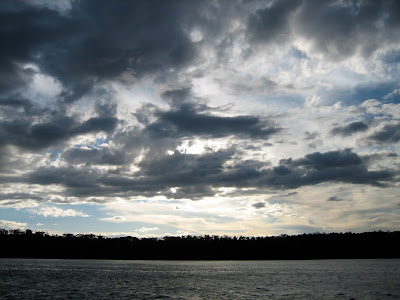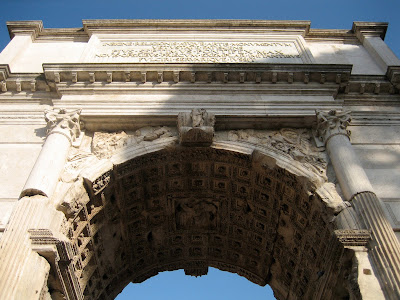The end is nigh? Apocalyptic thought and our present distress
The relation of apocalyptic thought to our present and likely future distress is an interesting and complex question, not easily answered in a few sentences. I've recently been reading a book edited by Stefan Skrimshire titled Future Ethics: Climate Change and Apocalyptic Imagination, which I mentioned back here. As is usual in an edited collection of essays, quality and relevance vary considerably, but the theme is an important one. How do our images of "the end" shape our understanding (or misunderstanding, as the case may be) of climate change?
For some activists, the pace and scale of anthropogenic climate change on our current trajectory represents an existential threat to the present order of the biosphere, including the human order of a globalised industrial civilisation of almost seven billion and rising. The language of apocalyptic is borrowed in order to try to gain some traction with policy-makers and the public. It matters not whether this borrowing represents a reflexive reliance on a thread of thought with its roots in religious discourse or the deliberate appropriation of concepts and tropes that still inhabit our imagination and so which will resonate widely. The goal is to induce an emancipatory shock, a recognition of our situation as extreme, a justification for emergency measures that disrupt the usual flow of commercial, political and social life with a radical reordering.
Some Christians, noting the borrowing of apocalyptic language by activists, are inclined to ignore the whole thing as another human attempt to claim control of even how the world is going to end. Instead, affirming that the end is in God's hands alone, they argue that any claims of humanity bringing about the end by our own efforts (even inadvertently) must be treated with extreme suspicion.
Personally, while it is difficult to get a good grip on the magnitude of the threat represented by climate change without recourse to some very strong language, I think that it is best to remain agnostic about the relationship between our preset distress and threats and the divine promises relating to ultimate realities. It may be that there is some link, but there is no particular reason in my opinion to think so. Even if our actions lead to the downfall of our way of life and the utter transformation of our society into something so different that in hindsight it is appropriate to speak of industrial civilisation having experienced a self-induced collapse, this need not be the end of the world. To use a line that is growing increasingly common, the end of the world as we know it is not necessarily the end of the world.
And where this cuts the mustard for me is that sometimes apocalyptic thought can become a lazy way out of ethical deliberation. Apocalyptic becomes lazy where it is in the service of a fatalism that assumes our destiny is doomed by the greater power of nature (whether acting blindly, under its own authority as a personified (and angry) mother earth, or as the instrument of God's inexorable judgement) or which conversely rejects the possibility of social self-destruction in principle. In each case, the future is seen as closed and human actions as ultimately irrelevant, in which case, let us eat and drink for tomorrow we die. It can also be lazy where it is used to create panic and a desperate acceptance of whatever medicine is closest to hand. This is a kind of non-emancipatory shock that stuns the hearer into passive acceptance of the salvific social, economic and/or political solution that swiftly follows the apocalyptic account.
Denying knowledge of the relationship between our time and time's telos keeps open the space for neighbourly care. It does this not by rendering apocalyptic inscrutably distant ("since we can't know when the end will come, then let us ignore the coming of the end altogether"), but constantly relevant. In Christian apocalyptic, the hidden meaning of history is revealed to be the stage of divine action, not in competition with human action, but as the previously unknown judge and liberator of human action. Since the day of divine judgement approaches like a thief in the night, unbidden and unobserved, the wise servant knows that her actions are made more weighty, not less. Instead of paralysing fear or enervating schadenfreude, she is liberated to conduct her faithful service in reverent hope of divine vindication. By such acts, she is not heroically securing the future; saving the world (or the present world order) is not her motive or modus operandi. Instead, she trusts that because the hour of her vindication approaches, she has time to prepare, to reflect with prudence on her ability to be a blessing in the limited time she has received. Waiting patiently, she need not dread the outcome of history, but is free to love her neighbour as an instantiation of her wholehearted love for the master with what strength and wisdom she has received. It may be that the immediate future holds suffering, even vast suffering, but not yet the end of all things. In which case, her actions undertaken in hope are not in vain; they are secured by the promise of the resurrection, and thus they are freed from the impossible burden of having to deliver her own life or the continued existence of her society.
And so, there is a sense in which the apocalypse has indeed already come, in the sense that apocalypse means "revelation", an unveiling of what was hidden. After Christ's coming, Christian believers now see the world and its future in a new light. No longer do the dark shadows of anticipated difficulties leave us blindly stumbling along in denial, distraction, desperation or despair. Once relieved of the responsibility to pursue survival above all else, we see the future as a stage on which faithful words and deeds may witness to the redemption of history through the cross and resurrection, and to the coming renewal of all things.























